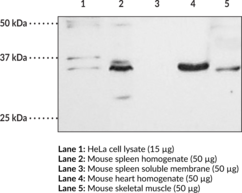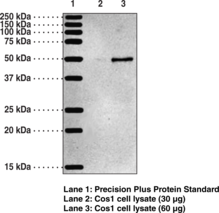Description
TNF-related apoptosis-inducing ligand (TRAIL) is a protein encoded by the TNFSF10 gene in humans and is a member of the TNF superfamily of proteins.{52585} TRAIL contains an N-terminal cytoplasmic domain, a transmembrane domain, and a C-terminal extracellular receptor binding domain.{52585,52586} It is produced in immune effector cells as a transmembrane precursor protein from which mature, soluble TRAIL is formed by proteolysis.{52586} Soluble TRAIL is cleaved from the precursor protein on the extracellular side of the membrane in response to stimulation by cytokines, such as IFN-γ (Item No. 32008).{52585} TRAIL monomers form trimers with a single zinc atom bound at the trimer interface, which is required for its structural stability and function.{52587} The trimer binds to the pro-apoptotic death receptors DR4 and DR5 and the decoy receptors DcR1 and DcR2, which lack functional intracellular domains.{52585} The intracellular death domains of DR4 or DR5 colocalize upon TRAIL binding, which recruits Fas-associated death domain (FADD) and pro-caspase-8 and initiates either the extrinsic or intrinsic apoptotic pathways depending on the cell type. DR4 and DR5 are highly expressed on a variety of cancer cells while DcR1 and DcR1 are primarily expressed on non-cancerous cells, which allows TRAIL to selectively induce apoptosis in cancer cells.{52588} Recombinant human TRAIL induces apoptosis in a variety of cancer cell lines and reduces tumor growth in mouse xenograft models.{52589} However, it increases proliferation in certain cancer cells in vitro, and other cells lines develop resistance, which can sometimes be partially mitigated by combining it with other agents. A cysteine-to-threonine mutation at position 723 of TNFSF10 is associated with sporadic breast cancer, and SNPS in TNFSF10 are associated with fatty liver disease, multiple sclerosis, and asthma.{52585} TNFSF10 expression is decreased in breast cancer patients with brain metastases and increased in patients with multiple sclerosis. In addition, protein levels of TRAIL are increased in patients with systemic lupus erythematous (SLE) and multiple sclerosis. Cayman’s TRAIL Polyclonal Antibody can be used for Western blot (WB) applications. The antibody recognizes TRAIL at approximately 35 kDa from human samples.
Synonyms: Apo-2L|Apo-2 Ligand|CD253|TNF Ligand Superfamily Member 10|TNFSF10
Immunogen: Synthetic peptide from an internal region of human TRAIL
Formulation: 500 µl of peptide affinity-purified polyclonal antibody
Isotype:
Applications: WB
Origin: Animal/Rabbit
Stability: 365 days
Application|Western Blot||Product Type|Antibodies|Polyclonal Antibodies||Research Area|Cancer|Cell Death|Apoptosis||Research Area|Cell Biology|Cell Death|Apoptosis||Research Area|Cell Biology|Cell Signaling|NF-κB Signaling||Research Area|Endocrinology & Metabolism|Metabolic Diseases|NAFLD & NASH||Research Area|Epigenetics, Transcription, & Translation|Transcription Factors||Research Area|Immunology & Inflammation|Adaptive Immunity||Research Area|Immunology & Inflammation|Autoimmunity|Lupus||Research Area|Immunology & Inflammation|Pulmonary Diseases|Asthma||Research Area|Neuroscience


